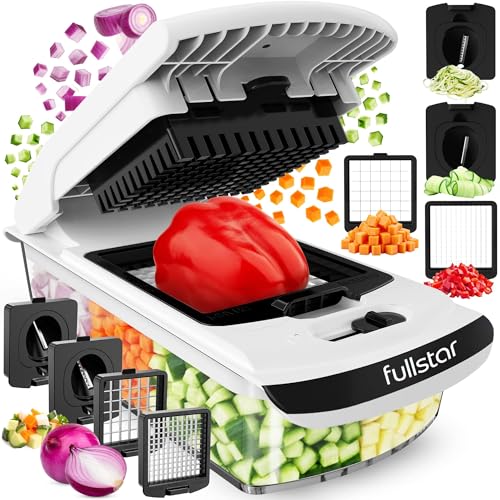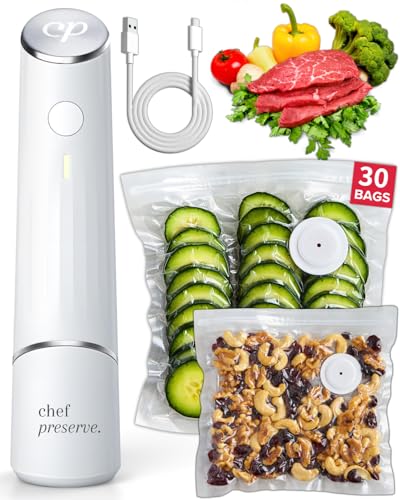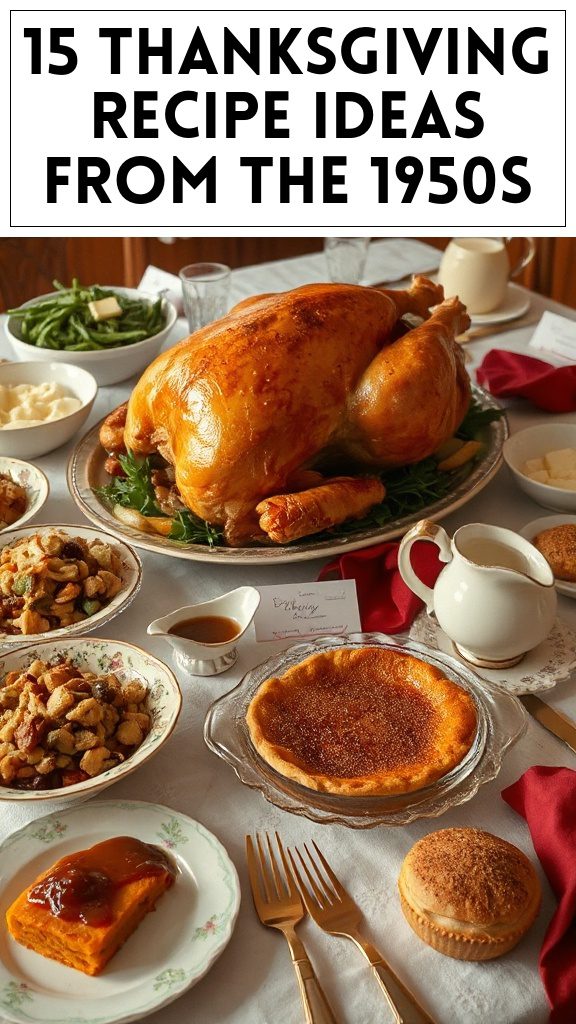Ancient Mediterranean Bread Tradition
The ancient Mediterranean bread tradition serves as a remarkable testament to the region’s rich cultural heritage and culinary evolution.
Rooted in the practices of ancient baking, these time-honored techniques have been passed down through generations, reflecting the diverse influences and ingredients available.
From the warm, crusty loaves of rustic villages to the thin flatbreads of coastal towns, each variety showcases distinct Mediterranean flavors.
Olive oil, herbs, and local grains come together harmoniously, capturing the essence of the region’s bounty.
This tradition embodies communal aspects of sharing and sustenance, bringing people together around the table.
As modern bakers revive these ancient recipes, they honor the past while inviting new interpretations, enriching the culinary landscape and ensuring the continuation of this cherished practice.
- The Original Pro Chopper - Our superstar veggie slicer has been creating waves on TikTok! Simple to use,...
- Easy Meal Prep with Rust-Resistant Blades - Our vegetable chopper is perfect for anyone who wants to eat...
- 5-Star Design - The soft-grip TPU handle ensures controlled chopping, while the non-skid rubber base...
Home Bakers and Garlic Lovers
Garlic enthusiasts and home bakers alike share a passion for crafting flavors that tantalize the taste buds. These culinary aficionados experiment with various baking techniques, exploring unique flavor combinations that enhance the aroma and taste of their creations.
The benefits of garlic extend beyond its robust flavor; it offers numerous health advantages, making it a beloved ingredient. Home bakers often play with dough variations, adjusting hydration levels and flour types to achieve the perfect texture.
Utilizing various raising methods, they create focaccia that is both airy and satisfying. Additionally, thoughtful herb selection elevates their garlic creations, infusing each bite with freshness and depth.
Together, these elements inspire a community driven by creativity and the love of baking.
- Makes Everything Simple : Just forget your bagged cheese! Only turn the handle for several times and get...
- Premium Material : All parts of the rotary cheese grater are made of food grade ABS material, no BPA. The...
- Three Option Grater : The parmesan cheese grater finishes food preparation with slicing, shredding and...
Essential Ingredients
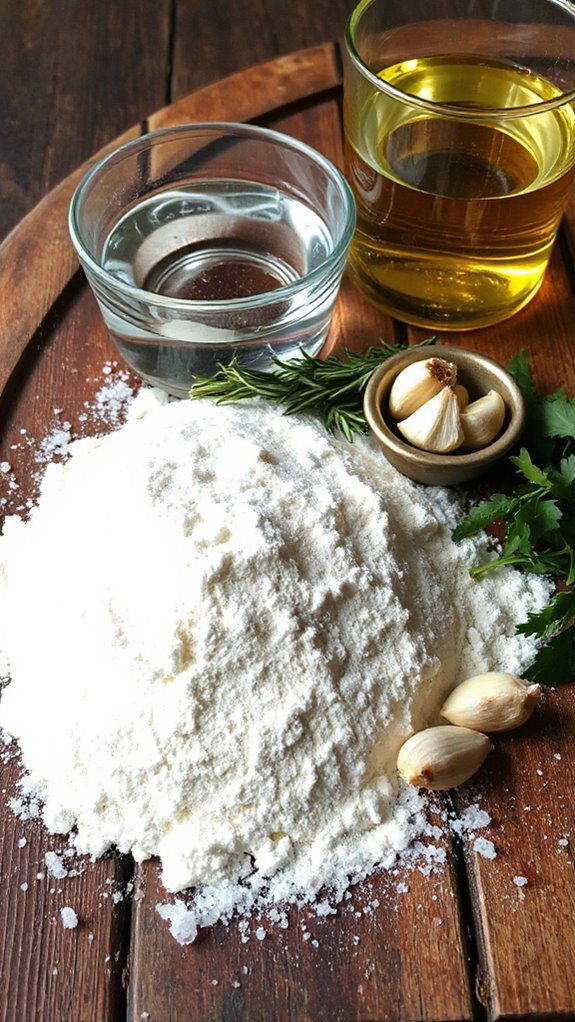
While crafting the perfect Herby Easter Garlic Focaccia, selecting essential ingredients is paramount to achieving the desired flavor and texture.
High-quality all-purpose flour serves as the foundation, providing the necessary structure. Fresh yeast introduces a delightful rise, while water at the right temperature activates the dough.
Essential herbs like rosemary, thyme, and parsley infuse the focaccia with aromatic essence, elevating its profile. Minced garlic adds an irresistible punch, harmonizing beautifully with the herby blend.
Olive oil not only enriches the dough but also contributes to a golden crust. Finally, the finishing touch of sea salt flakes delivers a crunchy contrast and flavor enhancement, making every bite memorable.
Together, these ingredients create the perfect toppings for this festive bread.
- 💰 REDUCE WASTE AND SAVE MONEY: Chef Preserve keeps FOOD FRESH 5 TIMES LONGER than non-vacuum storage...
- ✅ POWERFUL, QUICK & EASY TO USE: Simply press the button to start. The device vacuum seals a bag in 5...
- ♻️ REUSABLE & RESEALABLE BAGS: Chef Preserve comes with dishwasher, freezer, refrigerator, and...
Cooking Steps
As the dough comes together, a careful sequence of steps is vital for achieving the perfect Herby Easter Garlic Focaccia.
Start by gently kneading the dough, allowing the gluten to develop for an airy texture. Once smooth, cover it and let it rise until doubled, embracing the ancient tradition that ties back to garlic history, linking this fragrant ingredient to numerous cultures.
After the first rise, punch down the dough, shaping it into a pan while creating dimples with fingers, an essential technique in focaccia variations.
Finally, generously sprinkle minced garlic and herbs atop, finishing with a glimmer of sea salt flakes before the second rise. This thoughtful process ensures a delightful blend of flavors awaits every eager taste bud.
- Generous Capacity: 7-quart slow cooker that comfortably serves 9+ people or fits a 7-pound roast
- Cooking Flexibility: High or low slow cooking settings, with convenient warm function for ideal serving...
- Convenient: Set it and forget it feature enables you to cook while at work or performing daily tasks
1. Mix Warm Water and Yeast
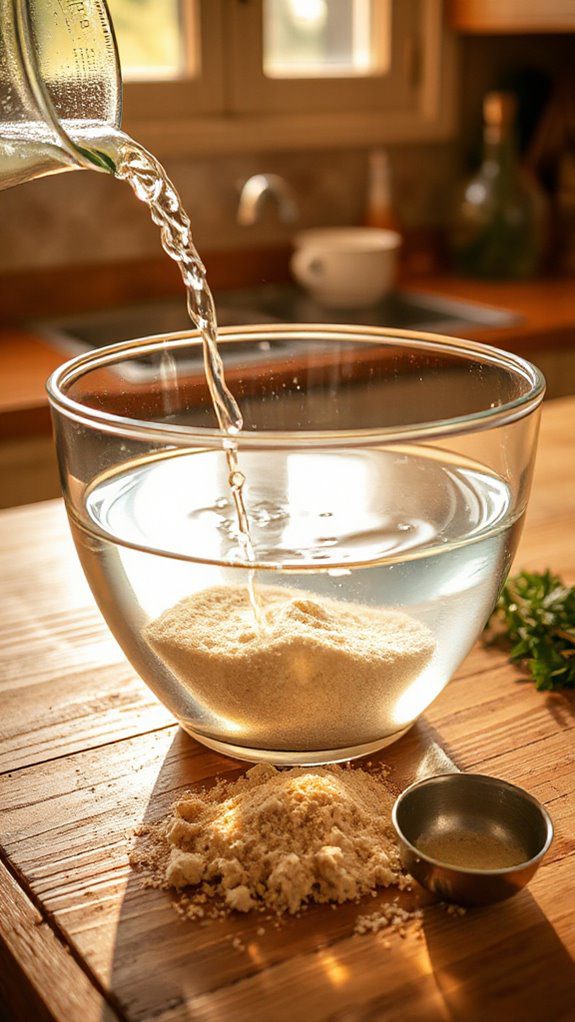
To initiate the creation of Herby Easter Garlic Focaccia, warm water and yeast must be combined in a harmonious blend. The warm water should be heated to a temperature between 100°F and 110°F, ensuring it is not too hot to kill the yeast.
Once the water reaches the desired warmth, the yeast is added, a crucial step in the yeast activation process. This gentle warming allows the yeast to awaken, becoming lively and producing bubbles as it begins to ferment.
Allowing the mixture to sit for about five to ten minutes gives the yeast time to thrive, resulting in a frothy layer on top. This froth is a clear indicator that the yeast is ready to work its magic in the dough.
- 100% Leak-proof: Guaranteed no-spill seal and secure latches
- Crystal-clear Tritan Built: Stain-resistant and odor-resistant material for a clear view of contents
- Lightweight & Sturdy: Easy to carry, yet durable for everyday use
2. Knead Dough Until Smooth
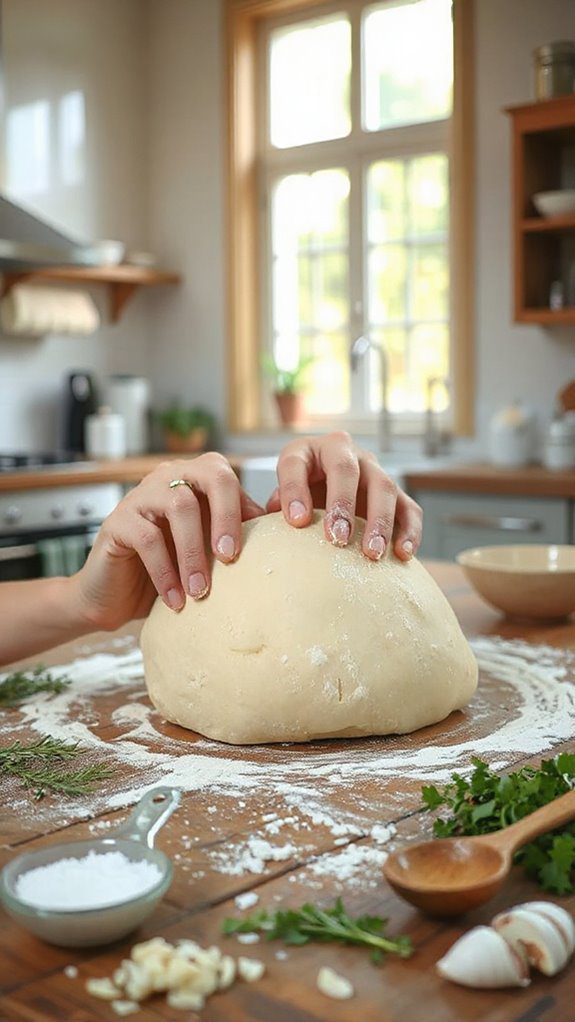
With the yeast now activated and frothy, attention turns to the next pivotal step: kneading the dough until it achieves a smooth, elastic consistency. This process is crucial in developing the right dough texture, ensuring a light and airy focaccia.
Using various kneading techniques, such as the fold-and-push method, the dough is transformed. As hands work through the mixture, it gradually transitions from a sticky mass to a silky ball.
The rhythmic motion not only incorporates air but also strengthens gluten, vital for structure. Kneading may take about 8 to 10 minutes, and the dough should spring back when pressed.
Mastering this technique lays the foundation for a beautifully risen focaccia that is both flavorful and satisfying.
- 𝗘𝗳𝗳𝗼𝗿𝘁𝗹𝗲𝘀𝘀 𝗪𝗲𝗶𝗴𝗵𝗶𝗻𝗴: Supports 5 units...
- 𝗣𝗿𝗲𝗰𝗶𝘀𝗲 𝗥𝗲𝘀𝘂𝗹𝘁𝘀: Accurately weighs up to 11 lb/5 kg with 1 g...
- 𝗦𝗶𝗺𝗽𝗹𝗲 & 𝗖𝗼𝗺𝗽𝗮𝗰𝘁: The small and sleek scale is a perfect fit for...
3. Add Herbs and Salt Mixture
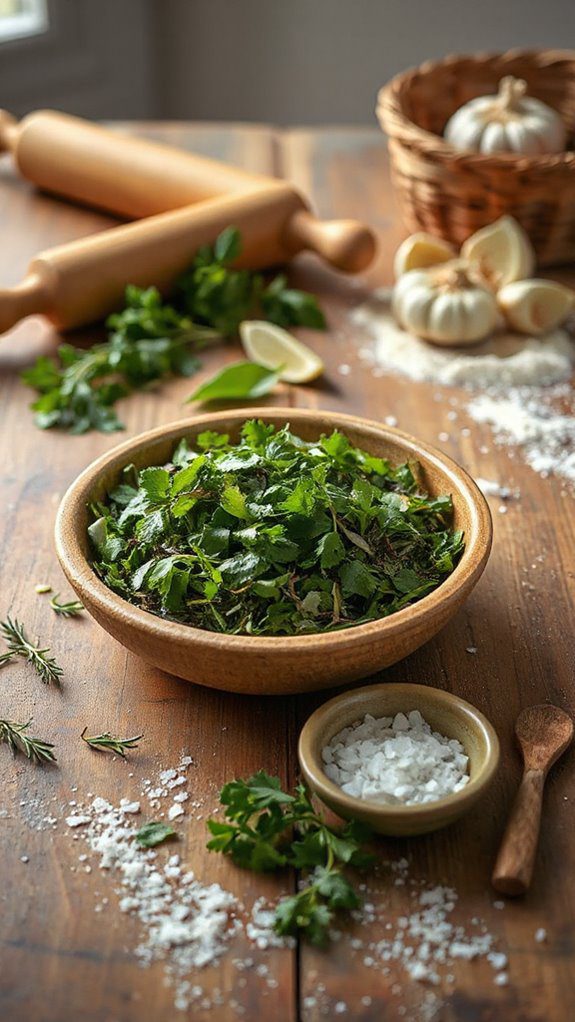
Once the dough reaches the desired smoothness, the time comes to infuse it with flavor through the addition of the herbs and salt mixture. This step transforms the humble focaccia into a vibrant creation.
A mix of herb combinations, such as rosemary, thyme, and oregano, can be gently folded into the dough, allowing their aromatic profiles to meld beautifully.
The selection of salt types is equally crucial; coarse sea salt flakes sprinkle an enticing crunch, contrasting with the softness of the bread’s interior.
As these ingredients mingle, they not only enhance the flavor but also create a fragrant experience that fills the kitchen with warmth and anticipation.
This thoughtfully crafted mixture is essential for achieving a truly herby Easter focaccia.
- Instant Read Food Thermometer | Our instant read thermometer features a temperature probe and advanced,...
- Multi-Use | From bbq thermometer to baking thermometer, our digital food thermometer for cooking is...
- Easy-Read Digital Thermometer For Cooking | Large instant thermometer dial with bright blue backlight...
4. Shape Dough Into a Rectangle
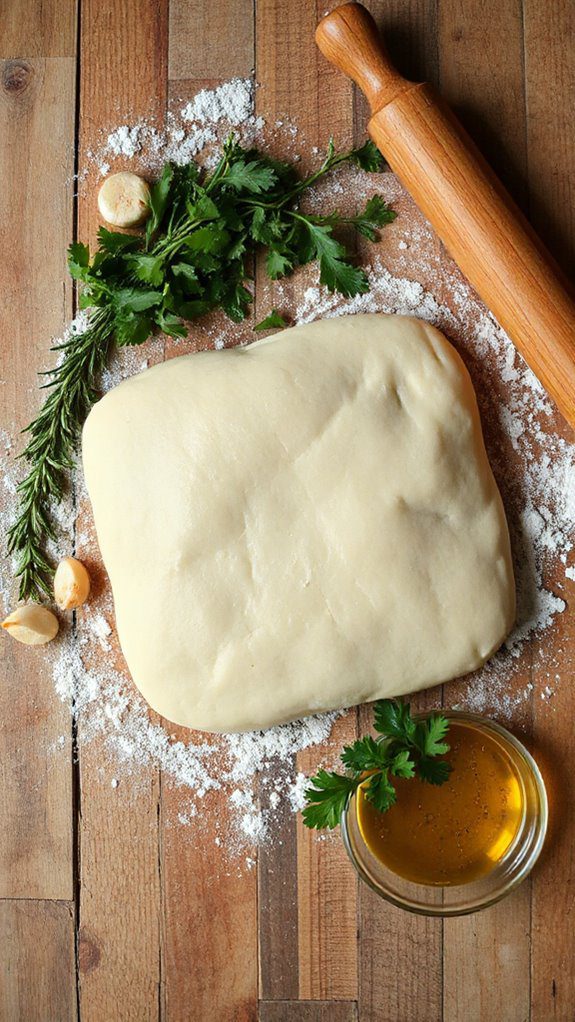
Gently pressing the dough onto a floured surface, the baker begins the transformation into a rectangular shape, essential for even cooking and presentation.
Employing precise dough shaping techniques, they lift and stretch the dough, guiding it into the desired rectangle. With measured confidence, the baker ensures the corners are squared and edges defined, critiquing the thickness to ensure uniformity. Each gentle pull enhances gluten development, making for a better texture, while maintaining the dough’s integrity.
If necessary, a light dusting of flour prevents sticking, allowing for smooth movement. The rectangular form is not merely aesthetic; it promotes even heat distribution during baking, resulting in a beautifully golden focaccia adorned with herbs and sea salt flakes.
Such attention to detail enriches the final outcome.
- Versatile 54-Piece Collection: Elevate your kitchen with the Home Hero 54-Piece Kitchen Utensil Set, a...
- Durable and Long-Lasting: Crafted from premium stainless steel, these kitchen utensils are designed to...
- Perfect Holiday Gift: Delight your loved ones with this kitchen utensils gift set this festive season....
5. Let Dough Rise Gently
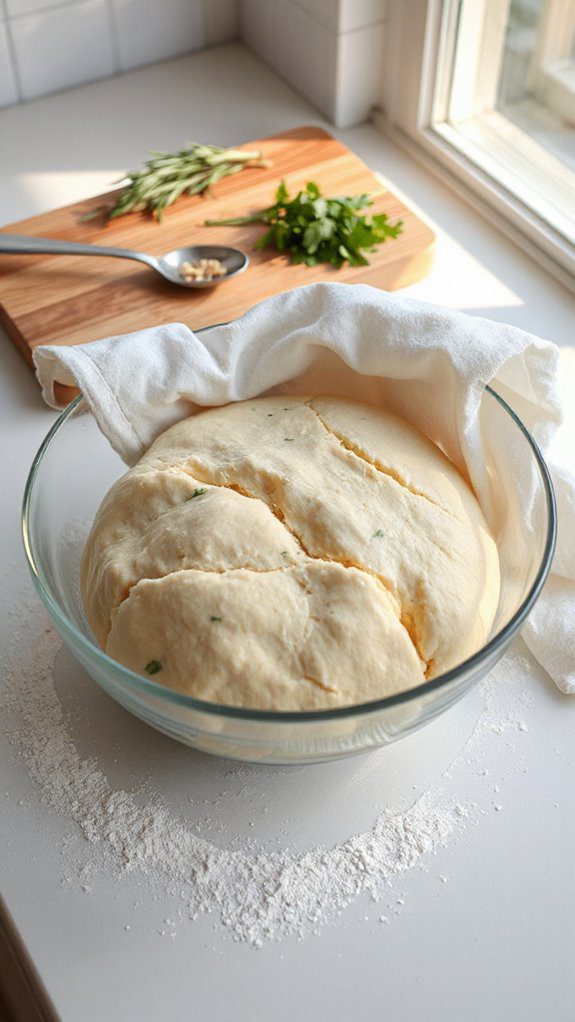
Allowing the dough to rise gently is a pivotal step in the bread-making process, contributing to the focaccia’s delightful texture and flavor.
During this phase, dough fermentation occurs as yeast consumes the sugars, producing carbon dioxide that creates airy pockets.
It’s essential to maintain an ideal rising temperature, typically between 75°F to 85°F, to optimize yeast activity without over-fermenting.
A gentle rise allows the gluten to develop properly, resulting in a soft, chewy crumb with a crisp outer layer.
Excessive heat can lead to rapid fermentation, compromising the dough’s structure and flavor profile.
Patience is key; allowing the dough to rest undisturbed cultivates a delectable focaccia that is aromatic and pleasing to the palate.
- 24-ounce insulated stainless-steel water bottle with a FreeSip spout and push-button lid with lock
- Patented FreeSip spout designed for either sipping upright through the built-in straw or tilting back to...
- Protective push-to-open lid keeps spout clean; convenient carry loop doubles as a lock
6. Preheat Oven to 450°F
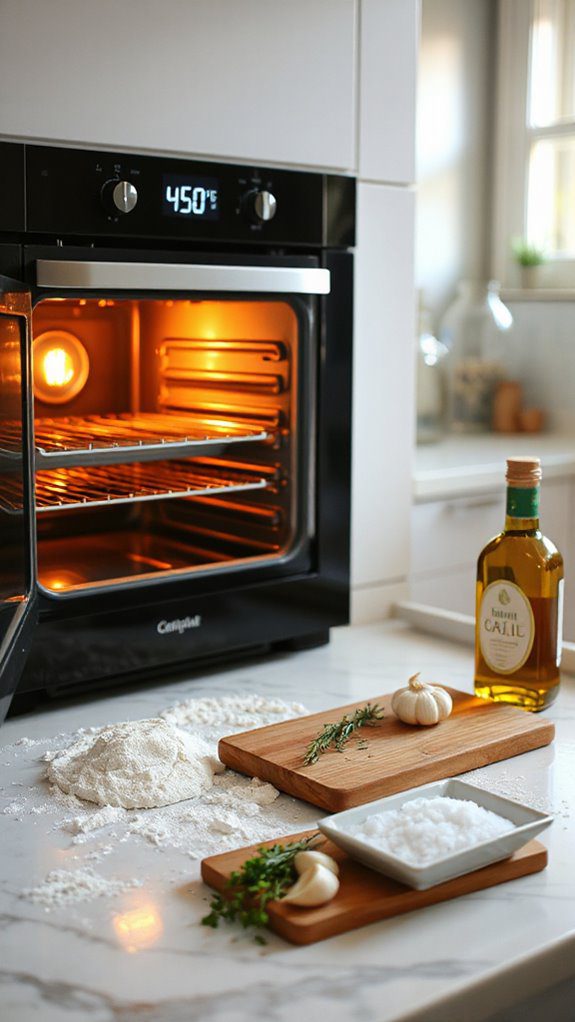
Before baking the focaccia, preheating the oven to 450°F is essential for achieving that perfect golden crust. The high oven temperature ensures that the bread bakes evenly and thoroughly, allowing the flavors of the garlic and herbs to meld beautifully.
As the heat envelops the dough, it creates a crispy exterior while the inside remains soft and airy, a delightful contrast that defines a great focaccia. The ideal baking time at this temperature is usually around 20 to 25 minutes, depending on each oven’s characteristics.
Monitoring the focaccia during this crucial stage helps prevent over-browning, ensuring that the bread emerges with a beautifully baked appearance, ready to be enjoyed with sea salt flakes sprinkled on top.
7. Cut Into Serving Pieces
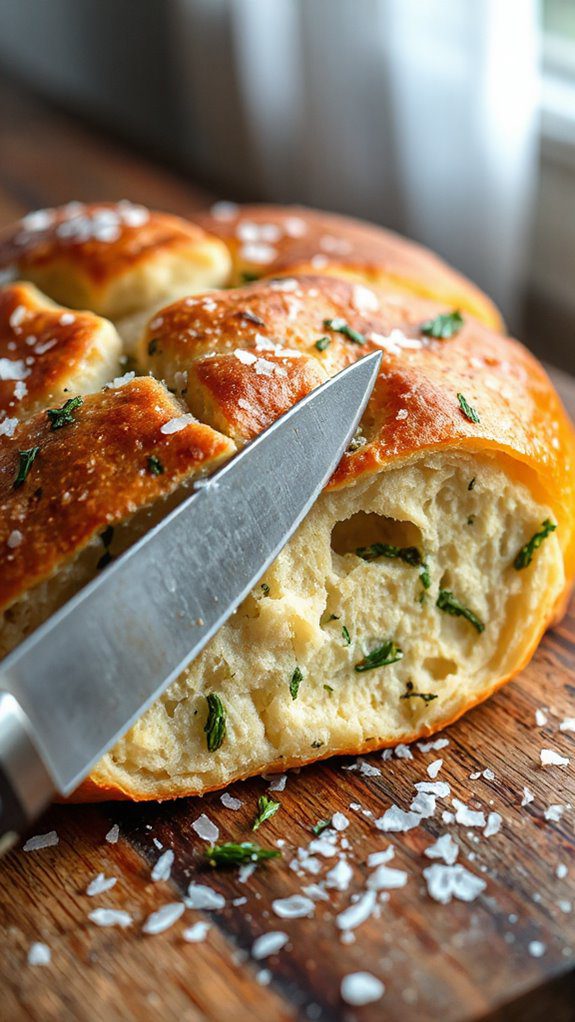
Once the focaccia has baked to a beautiful golden brown and has cooled slightly, the next step involves cutting it into serving pieces.
To achieve uniformity, a sharp knife is essential for determining how to cut the focaccia effectively. Ideally, one should aim for serving sizes that are approximately two to four inches square, allowing for easy sharing and enjoyment.
A gentle sawing motion ensures clean edges, showcasing the fluffy interior while maintaining the outer crust. For a rustic presentation, one could also opt for tearing the focaccia into pieces, enhancing its artisanal charm.
Regardless of the technique, properly cut serving sizes invite guests to savor each bite of this herby, garlic-infused delight during the Easter celebration.
Serving and Pairing Suggestions
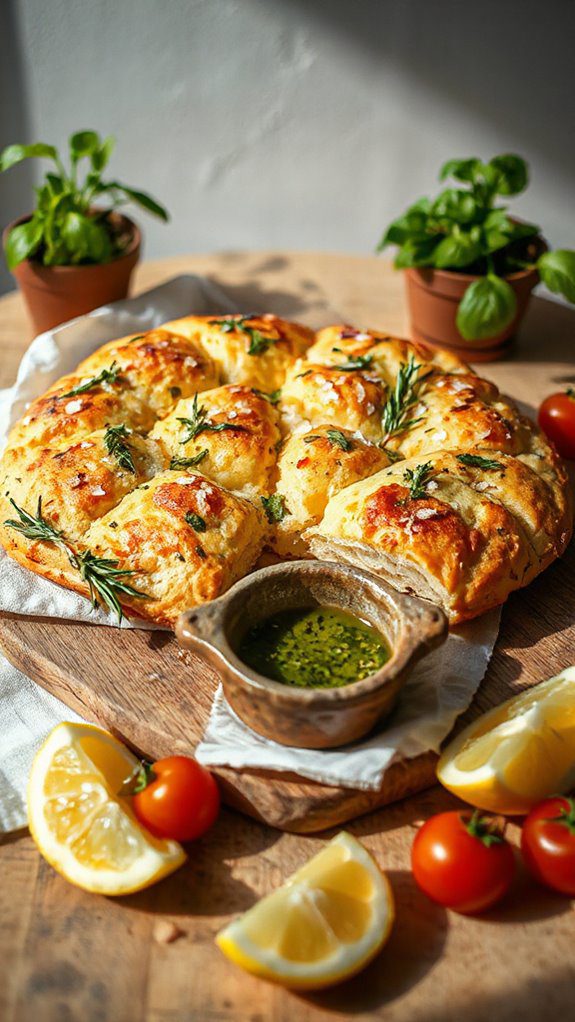
Serving and pairing the delightful herby Easter garlic focaccia can elevate the overall dining experience, transforming it into a memorable occasion.
This versatile bread complements various accompaniments, enhancing its aromatic flavors and inviting textures.
- Serve with rich dipping oils, such as balsamic vinegar infused with rosemary or chili-infused olive oil, for a flavorful kick.
- Pair with creamy herb spreads, like a tangy goat cheese blend or an herbed mascarpone, to create a decadent taste sensation.
- Accompany the focaccia with seasonal salads that feature vibrant greens and fresh herbs, adding a refreshing contrast.
- Enjoy alongside hearty soups or stews, as the focaccia can absorb and complement their robust flavors.
Together, these pairings celebrate the focaccia’s herby essence, catering to diverse palates.
Tips and Variations
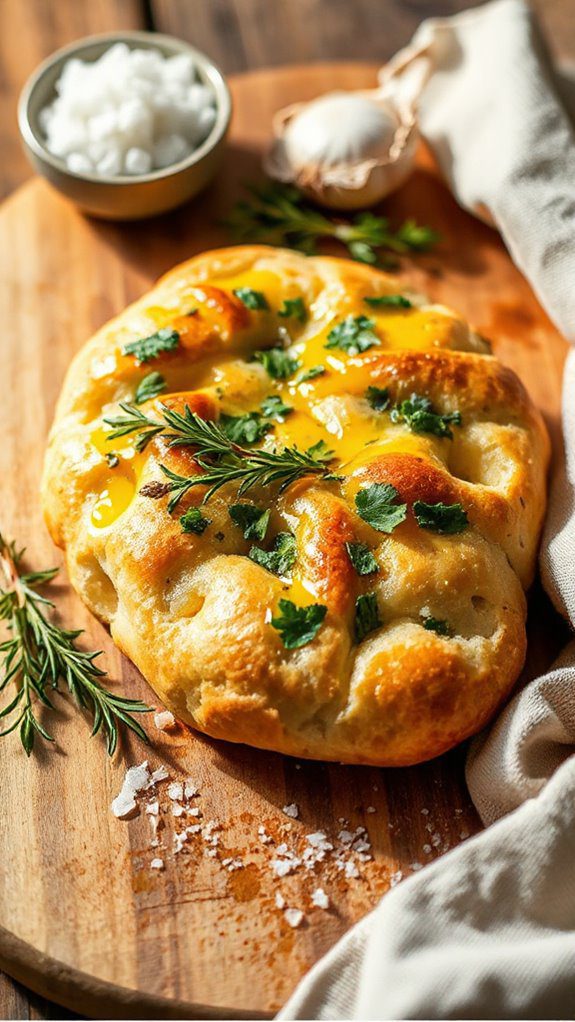
While experimenting with herby Easter garlic focaccia, home bakers can discover a world of possibilities that elevate this classic bread.
By incorporating different herb variations and serving tips, they can create a unique twist on this beloved recipe.
- Add rosemary and thyme for an earthy flavor profile.
- Incorporate sun-dried tomatoes or olives for a savory punch.
- Drizzle infused olive oil over the finished bread for extra richness.
- Serve alongside a vibrant, homemade dipping oil to complement the focaccia’s texture.
These innovative ideas not only enhance the taste but also invite creativity in the kitchen.
Kitchen Tools
A successful herby Easter garlic focaccia experience begins with the right tools in the kitchen. Essential kitchen gadgets elevate the baking process, ensuring that every step is executed with precision. A few selected baking essentials can make a significant difference in achieving the perfect focaccia texture and flavor.
| Tool | Purpose | Importance |
|---|---|---|
| Mixing Bowl | Combine ingredients | Essential for dough mixing |
| Measuring Cups | Accurate ingredient amounts | Crucial for consistency |
| Baking Sheet | Bake the focaccia | Ensures even cooking |
| Kitchen Scale | Measure flour precisely | Guarantees recipe accuracy |
With these tools at hand, anyone can create an aromatic and delicious focaccia that impresses family and friends alike.
Essential Equipment
Essential equipment is vital for anyone looking to craft the perfect herby Easter garlic focaccia. A selection of baking essentials can significantly enhance the process, ensuring golden-brown perfection and rich flavor.
Mastering focaccia techniques starts with the right tools in hand. Essential items include:
- Mixing Bowl: For combining ingredients and kneading dough.
- Baking Sheet: A non-stick sheet allows for even cooking and easy removal.
- Dough Scraper: Essential for maneuvering sticky dough and portioning.
- Instant-Read Thermometer: Ensures the perfect rise by checking dough temperatures.
Equipped with these tools, bakers can confidently delve into creating a flavorful focaccia, embracing both tradition and creativity in their culinary journey.
Nutritional Information (Estimated, per serving)
Understanding the nutritional information of Herby Easter Garlic Focaccia can guide health-conscious individuals in making informed choices without sacrificing flavor. This delicious bread offers a favorable nutrient breakdown, contributing to its appeal. Each serving contains a blend of essential macronutrients and beneficial vitamins, ideal for wholesome enjoyment.
| Nutrient | Amount per Serving | Health Benefits |
|---|---|---|
| Calories | 200 | Energy source |
| Protein | 5g | Supports muscle health |
| Carbohydrates | 30g | Quick energy and fiber intake |
| Fat | 7g | Healthy fats for heart health |
| Sodium | 250mg | Essential for hydration balance |
This nutrient-rich focaccia not only satisfies cravings but also promotes overall well-being, making it a delightful addition to any meal.
Related Treats to Try

Following the nutritious attributes of Herby Easter Garlic Focaccia, a range of delightful treats can complement its distinct flavors while offering variety.
With an array of Easter treats and savory options, the contrasting tastes enhance any festive celebration.
- Classic Garlic Bread: A timeless favorite, this buttery, herb-infused delight pairs wonderfully with soups and salads.
- Rosemary and Olive Oil Crackers: Crisp and aromatic, these crackers provide a perfect crunch alongside cheeses and dips.
- Sun-Dried Tomato and Basil Hummus: A flavorful spread, this dish invites indulgence and mingles beautifully with bread.
- Aromatic Herb Grissini: These elegant breadsticks, infused with herbs, add a sophisticated touch to any Easter brunch spread.
These related treats harmonize beautifully, elevating the dining experience.
Troubleshooting
Although baking Herby Easter Garlic Focaccia typically yields a delightful result, various factors can sometimes lead to challenges that may affect the outcome.
One common issue is incorrect dough consistency; if the mixture is either too sticky or too dry, it can hinder proper rising and texture. Achieving the perfect balance is key.
Additionally, yeast activation is crucial; using expired yeast or incorrect water temperature can prevent the dough from rising adequately. To troubleshoot, bakers should ensure yeast is fresh and proof it in warm water with a touch of sugar until bubbly.
If the dough fails to rise, reconsidering the environment and warmth can also make a significant difference in the fermentation process.
Conclusion
While baking Herby Easter Garlic Focaccia can present its challenges, the rewards of mastering this recipe far outweigh any potential obstacles.
This delightful bread not only enhances Easter traditions with its inviting aroma and flavor but also celebrates the health benefits of garlic. Rich in antioxidants and known for its immune-boosting properties, garlic adds both taste and nutritional value to the focaccia.
The vibrant blend of fresh herbs complements the dough, creating a dish that will impress family and friends during festive gatherings. As this focaccia takes center stage on the Easter table, it becomes more than just a culinary creation; it transforms into a cherished symbol of togetherness, flavor, and health that embodies the spirit of the holiday.

